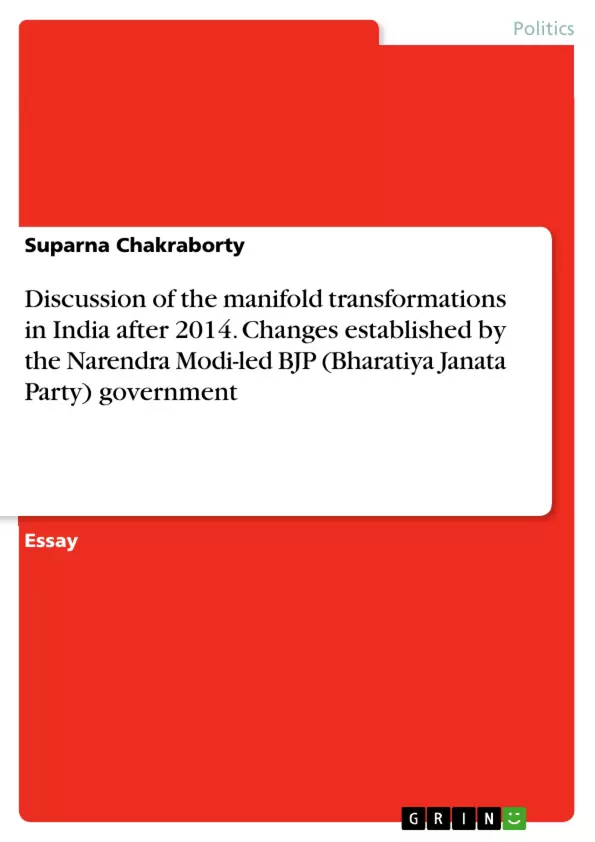I will discuss in this paper, the transformation of India after 2014 and how democracy suffers. In the contemporary scenario, the 2014 election in India was a welcoming year for militant Hinduism and extreme nationalism when BJP (Bharatiya Janata Party) came into power with 282 seats. A few incidents also took place regarding the harassment of democratic rights in the period during the UPA (United Progressive Alliance) government but things have changed drastically after the arrival of the NDA (National Democratic Alliance) government in India. It attacked the fundamental rights of people. The present government has started interrupting every aspect of people’s life. No one can decide what someone will keep for a meal in his or her refrigerator. The choice of food has been threatened. India has transformed a lot through the post-independence period to till date especially when Hindu nationalist party like BJP came into power.
Inhaltsverzeichnis (Table of Contents)
- Imagining Hindutva: Hindu Nationalism and Democratic Politics in India.
- The Transformation of India After 2014
- The Rise of Hindu Nationalism and its Impact on Democracy
- The Role of the RSS and its Shakhas
- The Threat to Freedom of Speech and Expression
- The Role of the BJP in the Rise of Hindu Nationalism
- The Implications of the Citizenship Amendment Act (CAA) and National Register of Citizens (NRC)
- The Role of Elite Parties and Poor Voters
- The Impact of Hindu Nationalism on Dalits
- The Role of the Media and its Impact on Democracy
- The Role of the Judiciary and its Impact on Democracy
- The Future of Democracy in India
Zielsetzung und Themenschwerpunkte (Objectives and Key Themes)
This paper aims to analyze the manifold transformations in India, particularly in the political, social, cultural, economic, and institutional spheres, that have been brought about since the Bharatiya Janata Party (BJP) government led by Narendra Modi came to power in 2014. It focuses on the impact of Hindu nationalism on democratic principles and practices in India.
- The rise of Hindu nationalism in India and its impact on democracy
- The role of the BJP and the RSS in promoting Hindu nationalism
- The threat to freedom of speech and expression in India
- The impact of Hindu nationalism on minorities and Dalits
- The implications of the Citizenship Amendment Act (CAA) and National Register of Citizens (NRC) for democracy in India
Zusammenfassung der Kapitel (Chapter Summaries)
- The first section analyzes the historical context of India’s democracy, highlighting the challenges it faced in the years following independence. It explores the roots of democracy in pre-colonial India and its evolution through the early years of the republic.
- The second section examines the rise of Hindu nationalism in India and its impact on democratic principles and practices. It focuses on the role of the BJP and the RSS in promoting Hindu nationalism and the growing threat to freedom of speech and expression in the country.
- The third section analyzes the impact of Hindu nationalism on minorities and Dalits in India. It explores the growing violence against these groups, the role of cow vigilante groups, and the challenges they face in accessing basic rights and freedoms.
- The fourth section examines the implications of the Citizenship Amendment Act (CAA) and National Register of Citizens (NRC) for democracy in India. It analyzes the controversial nature of these policies, their potential for discrimination, and their impact on the rights of minorities.
- The fifth section explores the role of elite parties and poor voters in Indian politics. It investigates the strategies used by elite parties to secure the support of disadvantaged groups, and the impact of these strategies on the functioning of democracy in India.
- The sixth section discusses the impact of Hindu nationalism on Dalits in India. It examines the challenges faced by Dalits in achieving equality and self-esteem, the role of liberal democracy in empowering them, and the ongoing struggle against caste hierarchy and discrimination.
Schlüsselwörter (Keywords)
The paper explores key themes such as Hindu nationalism, democracy, minority rights, Dalit rights, freedom of speech and expression, the BJP, the RSS, the CAA, the NRC, and the impact of these issues on the socio-political landscape of India. It draws on research from various scholars and political observers to provide a comprehensive analysis of the current situation in India and its implications for the future.
Frequently Asked Questions
What major political change occurred in India in 2014?
In 2014, the Bharatiya Janata Party (BJP), led by Narendra Modi, came to power with a significant majority, marking a shift toward Hindu nationalism in Indian politics.
How has democracy in India been affected since 2014?
The paper argues that democracy has suffered due to attacks on fundamental rights, threats to freedom of speech, and increased state interference in personal choices like food and lifestyle.
What are the CAA and NRC, and why are they controversial?
The Citizenship Amendment Act (CAA) and National Register of Citizens (NRC) are policies criticized for their potential to discriminate against minorities and challenge the secular fabric of Indian democracy.
What role does the RSS play in contemporary Indian politics?
The RSS (Rashtriya Swayamsevak Sangh) and its local units (shakhas) are instrumental in promoting the ideology of Hindutva, which heavily influences the BJP's political agenda.
How does Hindu nationalism impact Dalits and minorities?
The rise of militant Hinduism has led to increased challenges for Dalits and minorities, including violence from vigilante groups and struggles against traditional caste hierarchies.
- Quote paper
- Suparna Chakraborty (Author), 2020, Discussion of the manifold transformations in India after 2014. Changes established by the Narendra Modi-led BJP (Bharatiya Janata Party) government, Munich, GRIN Verlag, https://www.grin.com/document/1325833



